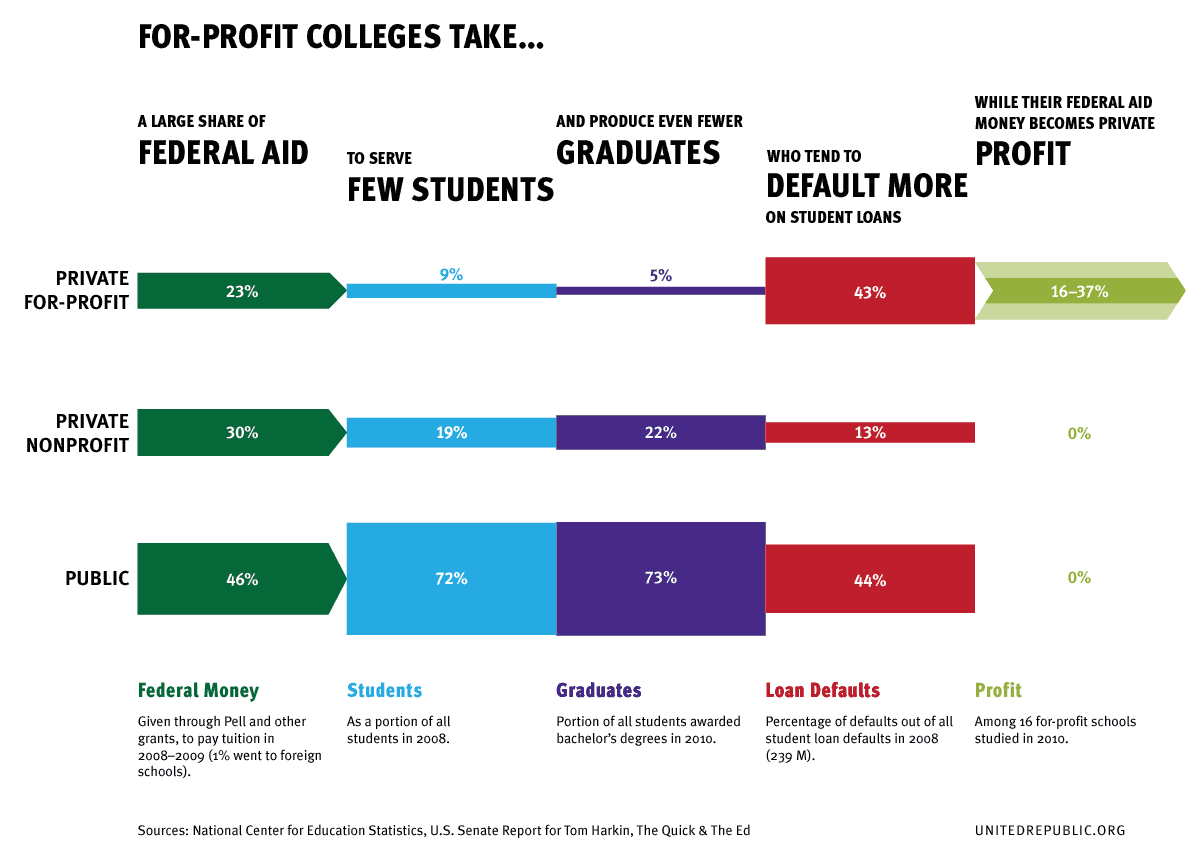A graphic highlighting the faults of for-profit schools
Corinthian Colleges, a large collection of for-profit colleges, is in its death throws, shutting down it's remaining 28 campuses, after many years of trouble with the Department of Education. Just last week they were fined $30 million for misrepresenting the value of a degree from their schools.While the Department of Education and the Consumer Financial Protection Bureau are planning on forgiving $500 million worth of debt held by Corinthian students, that doesn't make up for the private debts owed by students and the opportunity cost they suffered to get a worthless degree.
This is a clear example of what happens when demand far outstrips supply. Snake oil salesmen start peddling inferior goods to those desperate for a way out. In a world where post-secondary education is increasingly seen as crucial, there are too many opportunities for abuse.
Obama should work with Congress to pass some form of his plan to expand access to community colleges. This will create greater supply, taking power away from predatory for-profit institutions. Additionally, the Department of Education should follow through with the regulations published this year that will ensure that for-profit schools are enriching their students, not bleeding them dry.
What is the role of for-profit colleges in our higher education system? Should they be banned entirely? Left to their own devices?
Should students not have to pay off the loans they took out to go to Corinthian schools?

5 comments:
I think that as long as for-profit colleges are not misrepresenting the value of their services, there is nothing wrong with charging something for something they are willing to pay for. Misrepresenting the value of their degrees was already illegal and lawsuit-worthy in this case, so I don't think that it is necessary to change the policy regarding for-profit schools.
As far as whether or not the students should have to pay off the debts, the money gained in the lawsuit against the school should cover the debts. If the amount of money the school was sued for was not enough to do so, the amount should be increased. Unfortunately, although I don't like student loan companies, it would be wrong to force them to forgive so many millions of dollars of loans because of the actions of these colleges.
I think that strict regulation of the for-profit college market is appropriate as many benefit heavily from Pell grants. They are or had been receiving federal money to provide low-income students with an education. The promises were not fulfilled. By targeting low-income students, they sought to profit of the Pell grant program.
However, if as Alex says, the value is better represented, and perhaps there are no Pell grants, and students still wish to attend for-profit colleges, I think that is fine. People should be able to have a choice, but it should be an informed choice. Also, I don't believe that government money should be going to these institutions.
I am disgusted by any company that uses deception and lies to sell their product. However, we live in America and we have many freedoms and one of these freedoms is to become entrepreneurs, such as the founders of these schools. Since we live in a free market place, it is our responsibility, as consumers, to do our own research to make a reasonable and intelligent decision. I do feel for everyone who has lost and I do like that we have a system in place to shut down such underhanded and deceitful groups. As a general rule, people should know that if it sounds to good to be true, it probably is. I believe that even if the government did not shut them down and fine them, eventually these places would have closed on their own due to the free market system.
For profit colleges serve a purpose- to make profit. Students whom study at such colleges should know that their school they are studying at are a for-profit school, therefore students should know perfectly what they are getting themselves into. Whether it may be a misrepresentation of the value of their services or whatever, students should clearly know the risks of a for profit school. Now I am not saying that it is bad or not, but no matter the situation I believe that the students ultimately in the end, are to atone for any circumstances given. I do not think all for profit colleges are as bad as the one mentioned in the article. As long as the colleges work like they are advertised to then I think it is perfectly fine for them to be in the school market. However, I do feel like the colleges have responsibilities. It is unjust for Corinthian College to still have students whom still go to the school still have to pay debts for something that now is worthless. I think the Corinthian College should give the option for the students whom are currently enrolled in the college to either transfer to another school or get a refund.
I agree with Katie in that it seems like these colleges were just profiting off of government-funded Pell Grants. I also find it unfortunate that the Department of Education is going to forgive $500 million worth of debt held by the students. I think the Corinthian Colleges should play a role in repaying these tuition costs, since they failed to deliver what was promised by paying these costs, and should be forced to give a "refund" of sorts to the students. This is especially important because the students' private debts, if not payed off by the student, never goes away, even in bankruptcy. The colleges should be held accountable for the damage they've caused the students, costing them so much time and money.
Post a Comment